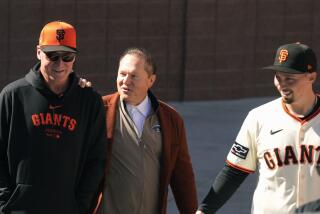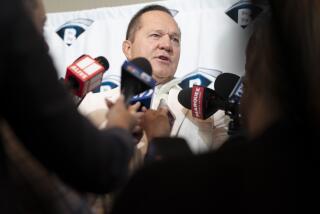Why Are Owners Going Slowly on Free Agents?
- Share via
The market?
Now it’s being picketed by the 26 major league baseball owners, who are showing unusual unanimity in avoiding bidding wars over the current crop of free agents and in offering contracts of no more than three years.
Business is so slow that a number of player agents believe the owners are guilty of collusion. They predict that if the situation doesn’t change before a series of December deadlines, the Major League Players Assn. will file a civil suit, challenging baseball’s antitrust immunity.
Said Los Angeles attorney Tom Reich, whose stable includes free agents Al Holland and Cesar Cedeno:
“I foresee a glut of unsigned and released players. There’s serious war drums. Its hardball. It’s taking on the appearance of the movie business, where the only people who have it made are the bankable stars. The fringe players are going to bleed.”
And maybe some of the bankable stars.
Donald Fehr, the union’s executive director, said from his New York office Monday that the situation does not appear healthy. “To say the least, the market is non-existent so far,” he said.
Would he call it a conspiracy?
“I don’t yet,” Fehr said. “If the pattern continues, it would strain the imagination to believe everybody is acting by accident. We’ll have to see what happens over the next four to six weeks.”
The union’s concern is based on the following:
--Of the 63 players who filed for free agency, only five have signed. All were retained by their 1985 teams: Steve Yeager by the Dodgers, Bobby Grich by the Angels, Doug Flynn by Detroit, Marty Bystrom by the New York Yankees and Scott Sanderson by the Chicago Cubs.
--Neither Detroit outfielder Kirk Gibson nor Angel relief pitcher Donnie Moore, the most attractive free agents, has received an offer from a club other than his own.
And neither Gibson nor Moore has received an offer from the Tigers or Angels of more than three years, which seems to be the way it is now.
Reached at his Seattle office, Gibson’s agent, Doug Baldwin, said that the trend resembles a conspiracy of the highest order.
“In my wildest dreams I can’t imagine Kirk remaining unsigned,” he said. “But as the clock ticks down, I’m sure the union will do something, and that something will touch upon a challenge of baseball’s antitrust exemptions.”
True?
“I don’t know,” Fehr said. “It could be. We could also file a grievance through the National Labor Relations Board or with an arbitrator under the terms of the collective agreement.
“It’s too soon to say.”
It’s too soon, Fehr said, because there is a belief that the owners are merely trying to give the retaining clubs an opportunity to sign their own free agents and that the competition will heat up with the December deadlines, all new to the free agent game.
This is how it works:
--All clubs must notify their respective free agents by Dec. 7 if they elect to settle their contract negotiations through arbitration. If on Dec. 7 the retaining club does not wish to pursue arbitration, then it cannot re-sign the player until May 1, which is tantamount to bidding him goodby, for he will have certainly moved on by then.
--A free agent who is notified by his retaining club that it wants to pursue arbitration has until Dec. 19 to decide if he agrees. If he does, then it is agreed that he will be returning to his ’85 team under terms of the arbitration or through continuing negotiations. If he decides on Dec. 19 to pass on the arbitration proposal, he has until Jan. 8 to sign with his previous team. After that, he cannot sign with it until May 1.
Thus, the key dates are Dec. 7 and Dec. 19. All clubs will have a clear view then of the retaining clubs’ desire to re-sign their own free agents. The clubs will have four to five weeks to get the job done without interfering bids from other teams.
Said David Pinter, Moore’s agent: “I’m shocked that there haven’t been any offers, but I don’t think there’s a conspiracy going on. The owners aren’t stupid. They’re not going to risk losing their antitrust exemptions.
“I do think there’s a gentlemen’s agreement by which the clubs are giving each other a chance to re-sign their own players.
“I think everything will open up on Dec. 8. It may not be like it used to be, but I’m not worried about Donnie Moore. Right now there’s nothing, but he’ll have a job. We’re hopeful it’s with the Angels, because that’s where he wants to stay.”
Moore, who set a club record with 31 saves, made $375,000 last year. The Angels recently proposed three years at a reported $2.4 million, but then withdrew it last week in a negotiating ploy designed to prevent Moore from shopping for counter offers.
“Big deal,” Pinter said of the withdrawal. “We weren’t going to accept that offer anyway.”
Gibson, who is 28, made $675,000 last year. Detroit has offered three years at a reported $1.2 million a year. The same club has, in other years, given five-year contracts to Jack Morris, Dan Petry, Larry Herndon, Chet Lemon, Alan Trammell, Lou Whitaker, Lance Parrish and Willie Hernandez.
Gibson, who also wants five, was infuriated by the three-year offer and responded with his only public statement on the subject, angrily saying that he would never sign with Detroit for that duration.
Said Baldwin Monday: “We’re not negotiating with the Tigers or anyone else, but I’m really not concerned. Most of the clubs have not completely shut the door. I think they’re saying, ‘Let’s lay off. Let’s give the retaining team a reasonable time to sign their own.’ I think we’ll see a change in December. I think that somehow Kirk will sign with the team of his choice.”
Six clubs were considered potential bidders for Gibson’s services-- the Yankees, Cubs, Dodgers, Angels, Atlanta Braves and Kansas City Royals. In curiously similar statements issued separately over the last month, each announced it would not bid against the Tigers and would not be active in pursuit of free agents.
Said Baldwin: “It was like they had all been given the same press announcement and then added their own twist.”
Said Reich: “What’s happening with Kirk Gibson tells you everything you want to know. It’s very cold out there. The owners are galvanized on the drug issue and they’ve found that galvanizing has a lot of benefits.”
Reich alluded to the current attempt by most of the 26 clubs to include a drug-testing clause in their new contracts, withholding a salary guarantee unless the player agrees.
“There’s some righteous indignation among the owners (regarding the drug problem) and its spilled over into other issues,” Reich said. “They’ve attempted this (the bidding restraint) before, but it hasn’t stuck. They have stronger leadership now. They have better communication, better dialogue, better reciprocity.”
There is a suspicion among the agents, most of whom requested anonymity on the subject, that the call for a cold war rather than a bidding war came from Commissioner Peter Ueberroth.
They seem to think that if the union challenges baseball’s antitrust immunity, Ueberroth will seek Congressional support, offering Washington, D.C., a 1987 expansion team in return.
Ueberroth said from his New York office Monday, that he had no knowledge of any agreement among the owners and doubted that one existed. “You can’t get 26 owners to agree on anything,” he said.
He said that he has never called for restraint because he has nothing to do with any actual decision on the revenue or expense side.
He said that it was only after club ledgers were opened during the recent collective bargaining negotiations that many owners realized the full weight of the game’s financial problems, and that the current situation was also the culmination of an annual trend toward more and more clubs withdrawing from the free agent and multiyear process, realizing that in most cases the return isn’t worth the investment.
The owners’ Player Relations Committee has been supplying the clubs with statistics in support of the latter contention, stressing a relationship between long-term contracts and a deterioration in performance. For example:
--In 1974, before free agency, the total of games missed by players on the disabled list was 489. In 1985, with the majority of players having multiyear contracts, there were more than 8,000 games missed.
--In 1985, the 26 clubs were still paying more than $40 million to players no longer active.
“What’s happening now is what the union’s own economist had predicted would happen during the collective bargaining negotiations,” PRC counsel Barry Rona said Monday, alluding to Roger Noll of Stanford.
“Mr. Noll said the owner’s own good judgment would eventually override any of their other considerations. I mean, I can’t believe the union is surprised or feels it has any cause for any kind of law suit or allegations. Conspiracy? That’s ridiculous.”
More to Read
Go beyond the scoreboard
Get the latest on L.A.'s teams in the daily Sports Report newsletter.
You may occasionally receive promotional content from the Los Angeles Times.










